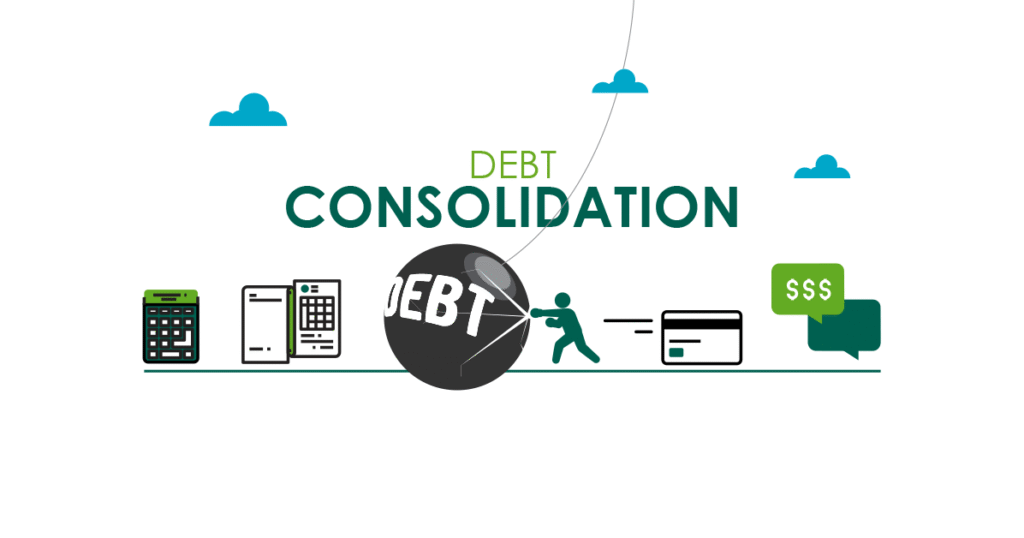Learn how a debt consolidation loan works, how to qualify, its pros and cons, and whether it can help you simplify monthly payments, reduce interest, and improve your financial health.
What Is a Debt Consolidation Loanv
A debt consolidation loan is a personal loan that allows you to combine multiple debts into a single loan with one monthly payment. This financial strategy is often used to consolidate high-interest credit card balances, medical bills, personal loans, or other unsecured debts.
Instead of managing several payments and due dates, you’ll be responsible for just one. Many people choose this option to lower their interest rate, simplify their budget, and get on a faster path to becoming debt-free.
How a Debt Consolidation Loan Works
The process is straightforward:
- You apply for a loan from a bank, credit union, or online lender.
- If approved, you receive a lump sum.
- You use that money to pay off existing debts.
- You repay the new loan in monthly installments, usually with a fixed interest rate.
Your new monthly payment typically stays the same until the loan is fully paid off. Loan terms can range from 12 to 84 months, depending on the lender and your credit profile.
Example: Real-Life Scenario
Situation:
- $3,500 on Credit Card A @ 22%
- $4,200 on Credit Card B @ 19%
- $2,300 in personal loan debt @ 16%
Total debt: $10,000+
Average interest rate: 19%+
Consolidation loan offer: $10,000 @ 10.5% over 3 years
Results:
- Lower monthly payment
- Interest savings over $1,500+
- One monthly bill instead of three
Used Throughout the Article
- consolidate credit card debt
- fixed interest rate loan
- credit score impact
- debt payoff strategy
- reduce monthly payments
- loan for multiple debts
- personal loan for debt relief
- financial planning
- unsecured loan
- manage debt repayment
Benefits of a Debt Consolidation Loan
Lower Interest Rates
Consolidation loans often come with lower interest rates, especially if your credit score has improved since you took out your other debts.
Simplified Repayment
No more juggling 4–5 different payments. One monthly bill means fewer missed payments and a cleaner budget.
Improved Credit Score Potential
Paying off revolving debt (like credit cards) with an installment loan may lower your credit utilization ratio, a key factor in credit scoring models.
Fixed Repayment Schedule
Unlike credit cards with variable interest and no payoff date, your loan has a clear end date.
Peace of Mind
Knowing your debts are under control can reduce stress and allow for better financial planning.
Drawbacks to Consider
Doesn’t Fix Spending Habits
A loan won’t help if you continue to accumulate new credit card debt after consolidating.
Loan Fees
Some lenders charge origination fees, which may range from 1% to 8% of the loan amount.
Higher Total Interest (Sometimes)
If you extend the loan term too long, you may pay more interest over time—even with a lower rate.
Potential Credit Impact
Your credit score might dip temporarily due to the hard inquiry during the loan application.
Who Should Consider a Debt Consolidation
Loan
- People with multiple high-interest debts
- Borrowers who can qualify for a lower rate
- Individuals with a steady income and good credit
- Anyone struggling to manage several due dates
If your current credit profile allows you to get better loan terms than your existing debt, consolidation is likely a smart move.
Who Should Avoid It
- Those with poor credit and no access to low-interest loans
- People likely to continue spending after consolidation
- Borrowers who only have one small debt (not worth consolidating)
How to Qualify for a Debt Consolidation Loan
Credit Score Requirements
Most lenders require a credit score of 580 or higher. For better rates, aim for 670+.
Debt-to-Income Ratio
Your monthly debt payments should not exceed 40-50% of your monthly income.
Proof of Income
Stable income is crucial. Lenders typically ask for pay stubs, tax returns, or bank statements.
No Recent Bankruptcies
Lenders will review your credit history, and recent bankruptcies may result in automatic disqualification.
Where to Get a Debt Consolidation Loan
| Lender Type | Pros | Cons |
|---|---|---|
| Banks | Lower rates for existing customers | Stricter approval requirements |
| Credit Unions | Member-friendly terms | Membership needed |
| Online Lenders | Fast approval and funding | Higher APR for bad credit |
| Peer-to-Peer (P2P) | Flexible qualification criteria | Less regulation |
How to Apply
- Check your credit score
- Compare lenders for interest rates and fees
- Pre-qualify (if available) to estimate terms
- Submit an application with documents
- Use the funds to pay off your other debts
- Stick to your repayment plan
Common Mistakes to Avoid
- Not comparing loan offers
- Using the loan to pay off debt—then running up credit cards again
- Ignoring origination or prepayment fees
- Not checking if your debt is already eligible for 0% transfer offers
Debt Consolidation Loan vs Other Options
| Option | Good For | Downsides |
|---|---|---|
| Balance Transfer Cards | Short-term credit card debt | High APR after promo period ends |
| Debt Management Plans | People needing help with multiple creditors | Monthly fee; may affect credit slightly |
| Debt Settlement | Severe financial hardship | Hurts credit score |
| Bankruptcy | Last resort | Major impact on credit report |
Long-Term Effects on Credit Scorev
A debt consolidation loan may initially lower your score due to the hard inquiry. Over time, however, it can:
- Improve credit utilization (by reducing card balances)
- Strengthen your payment history
- Improve your mix of credit types
Frequently Asked Questions
Can I get a debt consolidation loan with bad credit?
Yes, but expect higher interest rates. Consider credit unions, co-signers, or secured loans if your credit is below 600.
Does a debt consolidation loan hurt my credit score?
Initially, it may dip due to a hard credit pull. Long-term, it can improve your score if you make on-time payments.
Are debt consolidation loans worth it?
They are worth it if they reduce your interest rate and help you repay debt faster without accumulating new balances.
How long does it take to pay off a consolidation loan?
Typical terms range from 24 to 84 months, depending on the loan amount and monthly payment.
Is a balance transfer better than a consolidation loan?
Balance transfers can be cheaper in the short term (0% APR offers), but only if you repay before the promo period ends.
Conclusion
A debt consolidation loan is a powerful tool when used correctly. It helps you simplify your monthly payments, potentially reduce interest, and regain control of your finances. But it’s not a magic fix. Make sure you’re ready to avoid accumulating new debt and stick to a plan.
Compare offers, understand the terms, and choose a solution that truly aligns with your financial goals.

